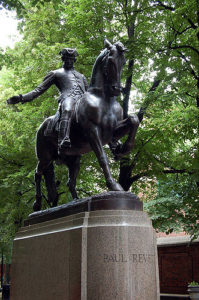Brown Beauty – hero of Lexington and Concord – It could be said.
We know that Paul Revere, on that famous night, was rowed across Back Bay to meet up with rebel forces in Charleston. There, waiting for him, were Whigs that provided him with a horse.
The horse belonged to Samuel Larking, a fisherman and chair maker from Charleston. It was requested by John Larkin, a very wealthy merchant and deacon from Charleston. Often history tells us that it was “Deacon Larkin’s horse.” Apparently it was his father’s.
 There are many versions of the story with a number of names for this equine hero. Among them, Sparky. That doesn’t sound very heroic. The Larkin family history says the horse was named Brown Beauty. Still, not all that heroic a name. Seems like it should have been William Wallace or something. But I digress.
There are many versions of the story with a number of names for this equine hero. Among them, Sparky. That doesn’t sound very heroic. The Larkin family history says the horse was named Brown Beauty. Still, not all that heroic a name. Seems like it should have been William Wallace or something. But I digress.
Though we don’t know for sure what breed of horse Brown Beauty was, she was likely a Naragansett.
Horse Show Central’s article says this, “Brown Beauty was probably of a breed of horse that was very popular at that time on the East Coast. Instead of the jarring two-beat trot, the Narragansett offered a smooth four-beat saddle gait, favored for its speed and comfort. In addition the breed had an amiable, courageous temperament vital in times of crisis. The Narragansetts were a direct derivative from Old English Ambler (palfreys) which had been taken across the Atlantic by the pioneers and later became extinct in Britain; and of course are the forerunners of today s American Saddlebred.”
The Narragansett is now extinct.
What happened to Brown Beauty?
Well, the horse was confiscated by the Redcoats that captured Paul Revere – um, no, he didn’t make it to Concord.
Legend has it that the sergeant that stole the horse from Revere rode her to death that night. At any rate, the horse was never returned.
But Brown Beauty wasn’t the only Larkin family loss in 1775.
According to the Larkin Genealogy page, “During the Battle of Bunker Hill, some British troops marched through the Boston suburb of Charlestown, Massachusetts, where the Larkin families lived. John's brother, Ebenezer Larkin (1740-1794), fired a musket from a window of his home at the British troops, who in reprisal, burned the Larkin homes to the ground. John Larkin and his family fled, unscathed, to Cambridge where they lived in a house once occupied by General Washington and later by Henry Wadsworth Longfellow.”

